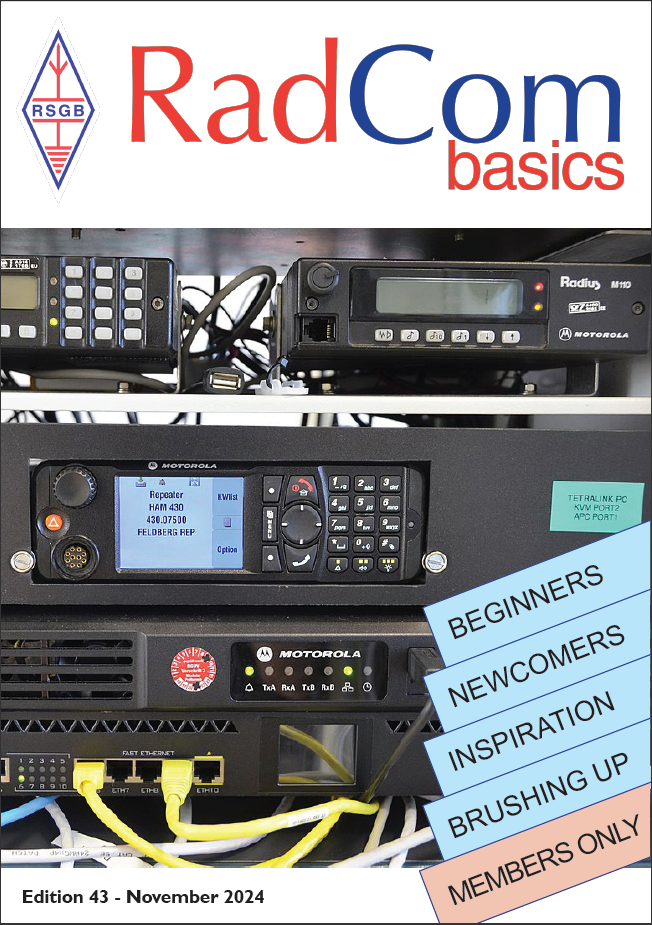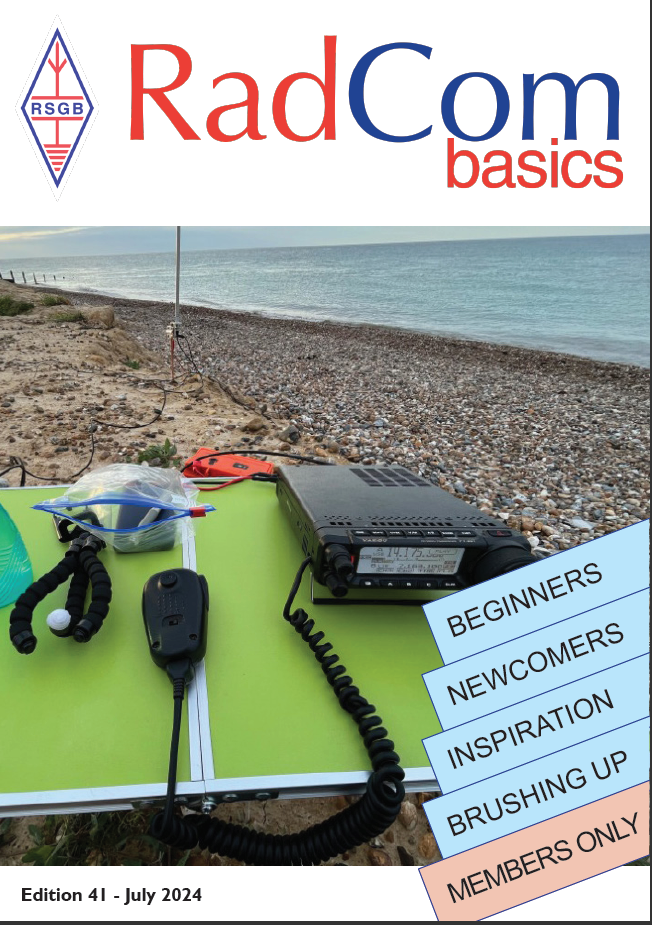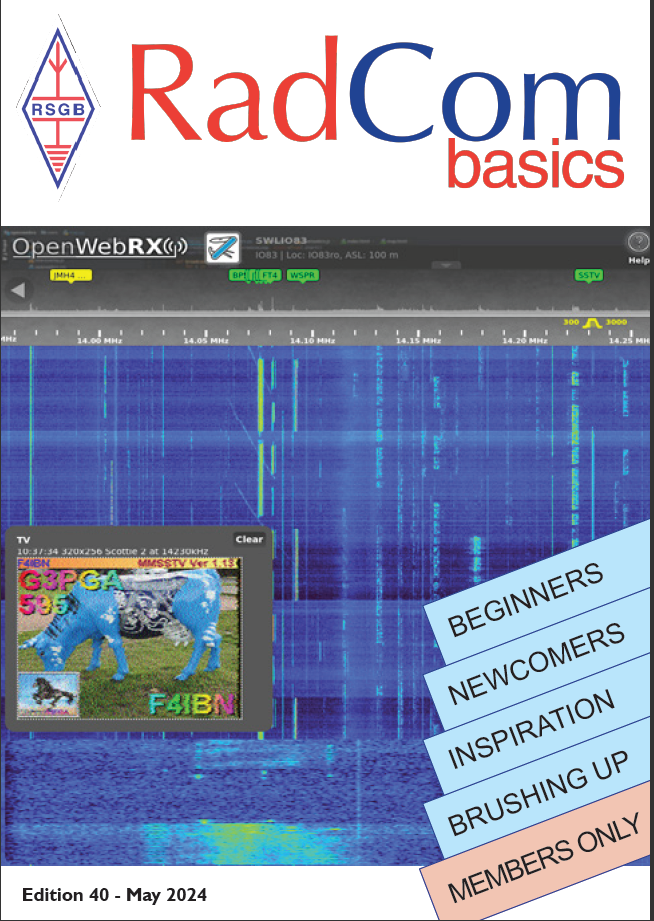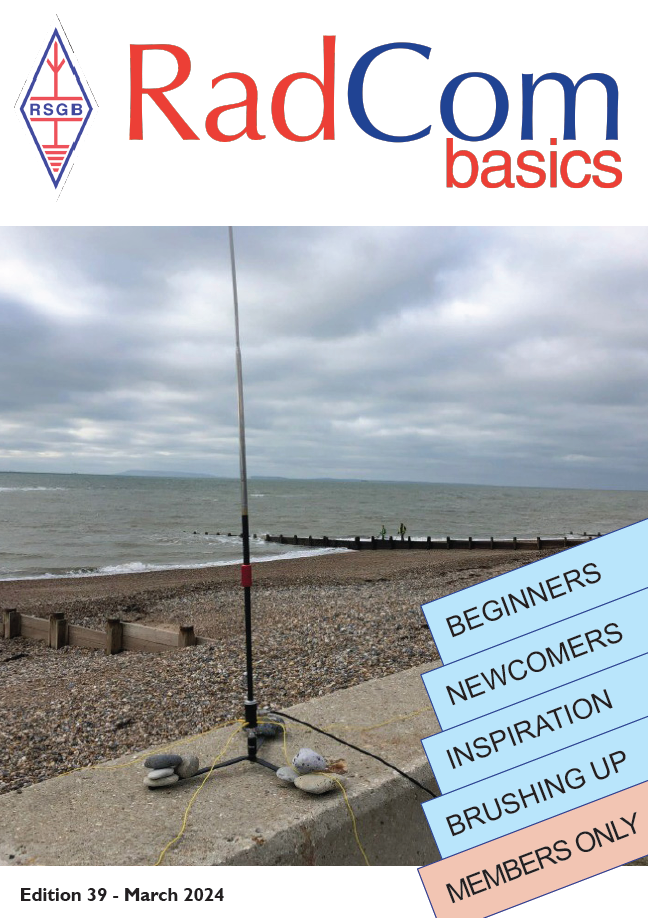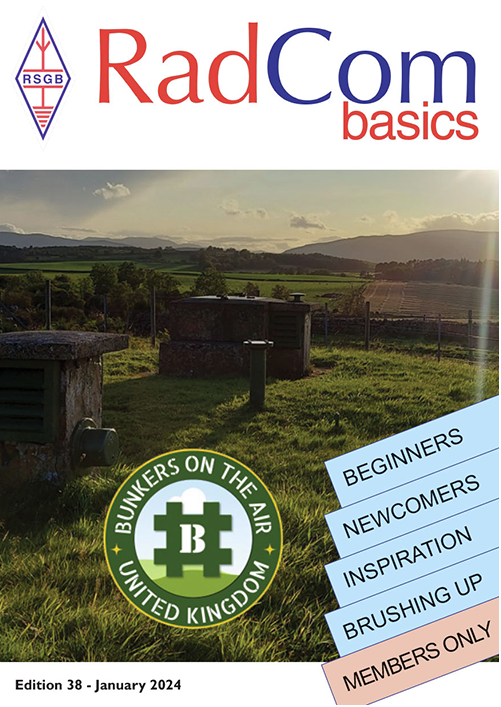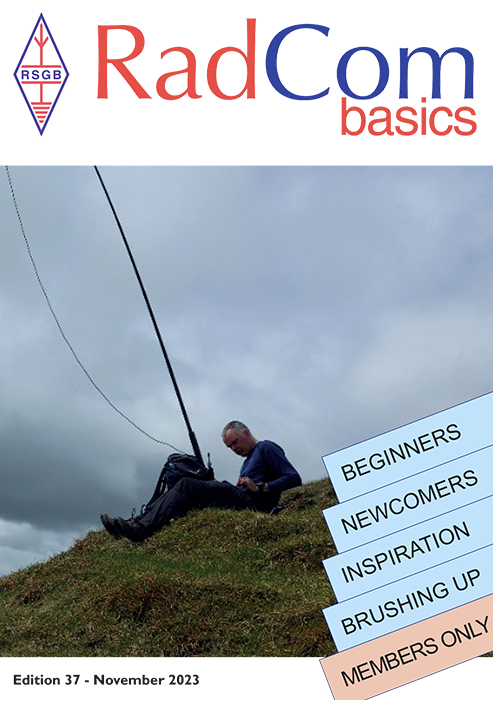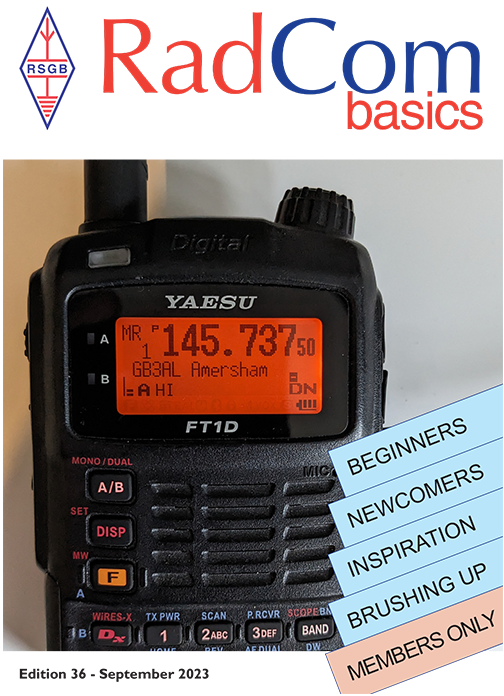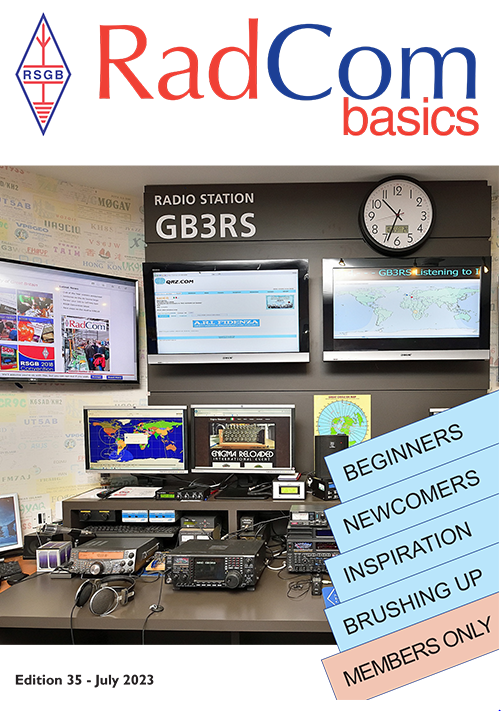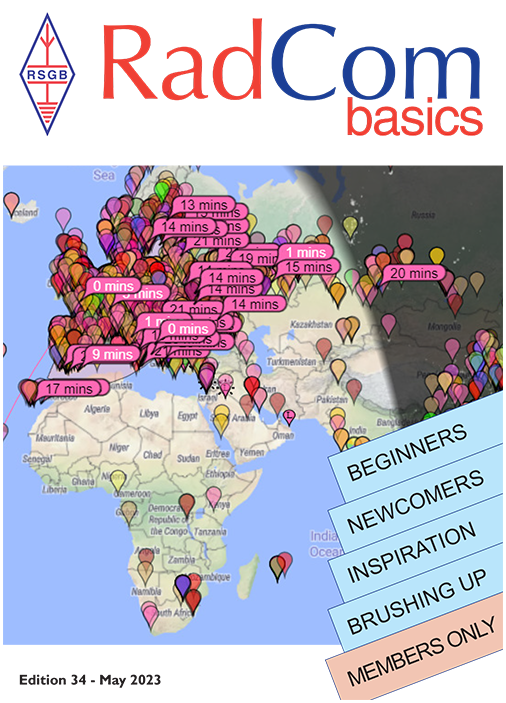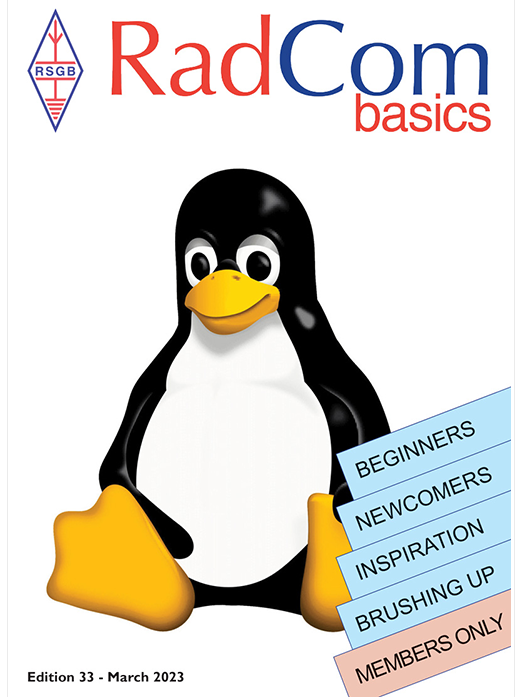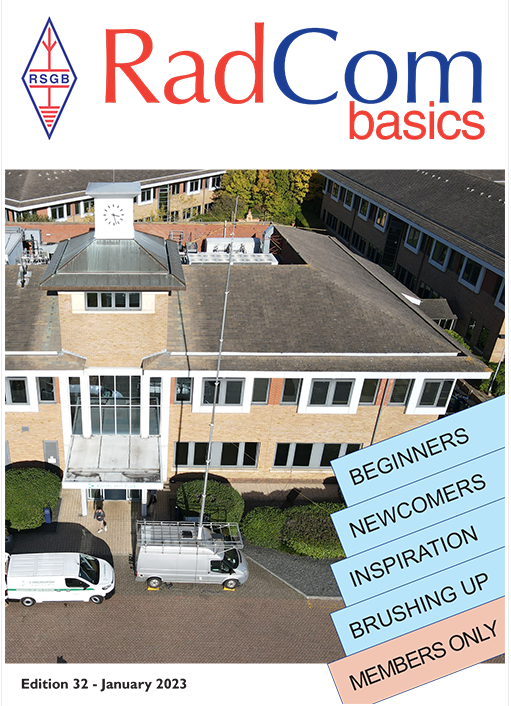RadCom Basics, No. 43, November 2024
Using repeaters
We look at how to access repeaters, the benefits of using repeaters, and operating practice when using them.
In this edition…
- 4 How to get on 40 metres with a small suburban garden: Part 1
A look at two antenna designs used successfully to operate on 40 metres from a typical semi-urban postage-stamp sized garden - 10 Using repeaters
Advice for the new or returning amateur operator about using repeaters. We look at how to access them, the benefits of using them and operating practice when using repeaters - 16 Home construction methods: Part 2
Are you new to amateur radio and would like to build something to add to your station? This final part of this series provides some great tips and advice on further methods of construction
28 Reviving Halifax and District ARS
Matt Hardy, M7EUP explains how his local club has overcome the crisis posed by the COVID-19 pandemic and lockdowns to re-flourish as a vibrant club - 34 A useful three-band antenna for portable or small gardens
A design used to gain access to 40, 20 and 10 metres. This vertical antenna takes up minimal horizontal space, is radial free, and is simple to make. Just apply a 49:1 transformer! - 41 Index of RadCom Basics articles, editions 1 to 43
Provides you with an up-to-date reference to all RadCom Basics articles.
RadCom Basics, September 2024, Edition 42
Home construction methods: Part 1
Great tips and advice on how to approach kit building and tips on how to master soldering
In this edition…
- 4 An off-centre fed vertical for the 10m band
How to use a 9:1 UNUN for making a mono-band vertical for the 10m band, as an off-centre fed antenna - 10 Making an end-fed halfwave antenna for the 20 and 15m bands
How to design and easily build an end-fed half-wave antenna for portable use on the 20 and 15m bands - 16 Home construction methods: Part 1
Are you new to amateur radio and would like to build something to add to your station? This first part of this series provides some great tips and advice on how to approach kit building and tips on how to master soldering
28 Amateur radio and getting fit
The beneficial impact of combining amateur radio and getting some fresh air! In a bid to defeat a sedentary lifestyle, how a shack potato can have some joy using a simple setup on a hilltop on the 2m band, whilst striving to shed some pounds! - 34 Up and outer antenna
A look at this often-forgotten antenna design. Examining the theory behind the design itself and its possible use for the higher HF bands - 40 Index of RadCom Basics articles, editions 1 to 42
Provides you with an up-to-date reference to all RadCom Basics articles
RadCom Basics, July 2024, Edition 41
Operating HF portable by the sea
Tim Hier, G5TM explains the likely beneficial impact of operating next to saltwater.
In this edition…
- 4 Checking and testing components: Part three
In this final instalment, Lee Aldridge, G4EJB, provides guidance about how to check and test components. In this edition, Lee examines how to test conductors and semi-conductors and which equipment to use - 14 Building and tuning dual-band end-fed half-wave antennas
Tim Hier, G5TM looks at how to design and easily build end-fed half-wave antennas for portable use and using two bands which are not harmonically related. Bands such as 10/15m, 12/17m, 15/20m are all examined. Tim also examines how to design and build the loading coil required and how to measure the inductance required - 20 Keeping it clean! A guide to clean transmissions: part three
In this third and final part of this series, Andy Gilfillan, G0FVI provides some great tips and advice on how to control the impact of harmonics, phase noise and distortion - 26 Operating HF portable by the sea
Tim Hier, G5TM explains the likely beneficial impact of operating next to saltwater. Modelling is examined and reference is made to others who have examined the impact in the real world. Tim also undertakes an activation on 20m and explains the equipment used and the results - 32 Choosing an antenna for 40m portable operating
Tim Hier, G5TM looks at the available choices for operating portable on 40m. Tim considers just how much of a compromise short vertical antennas are and how the choice of antenna is important for daytime 40m portable operating. - 41 Index of RadCom Basics articles, editions 1 to 41
Provides you with an up-to-date reference to all RadCom Basics articles
RadCom Basics, May 2024, Edition 40
OpenWebRX+ on a Raspberry Pi
Tony Molloy, M6CIH takes an interesting look at this method of accessing one or more SDR devices using a browser, and covers its uses, set up and installation.
In this edition…
- 4 Checking and testing components: Part two
In this second instalment, Lee Aldridge, G4EJB provides guidance on checking and testing components and, specifically, how to test capacitors - 14 Keeping it clean! A guide to clean transmissions: Part two
In this second part of this series, Andy Gilfillan, G0FVI provides great tips and advice on how to transmit a clean signal, focusing specifically on AM and SSB modes - 20 Building and tuning an end-fed half-wave antenna for the 40 to 10m bands
Matt Hardy, M7EUP documents his experiences in making, installing, and tuning this popular multi-band antenna at his space-restricted QTH, and outlines what he had to consider not only to tune the antenna but also how to gain the best possible performance - 26 OpenWebRX+ on a Raspberry Pi
Tony Molloy, M6CIH takes an interesting look at this method of accessing one or more SDR devices using a browser, and covers its uses, set up and installation - 34 How a full-wave loop behaves
Tim Hier, G5TM examines how a typical rectangular full-wave loop for the 40m band can be made to radiate differently depending on where it is fed - 41 Index of RadCom Basics articles, editions 1 to 40
Provides you with an up-to-date reference to all RadCom Basics articles
RadCom Basics, March 2024, Edition 39
Operating portable, a personal experience
Mark Hartley, M0XCZ reflects upon his experiences of portable operating and provides an account aimed at encouraging amateurs to get out there and experience the benefits of portable operating.
In this edition…
- 4 Checking and testing components: Part one
Lee Aldridge, G4EJB, provides guidance about how to check and test components. This is useful if you are thinking about constructional work, repair work, or rebuilding old equipment. Lee provides some basic pointers and tells us how to avoid potential pitfalls - 14 Working the 160 and 80m bands from small gardens and limited space: Part two
Andy Gilfillan, G0FVI explains the challenges of operating these two low HF bands from restrictive small gardens and spaces - 22 Verticals and radials, how important are they?
In this article, Tim Hier, G5TM examines the extent to which radials play a part in enhancing the performance of a HF vertical antenna - 28 Operating portable, a personal experience
Mark Hartley, M0XCZ reflects upon his own experiences of portable operating. Mark provides an account aimed at encouraging amateurs to get out there and experience the—sometimes unexpected—benefits of portable operating. - 34 Keeping it clean! A guide to clean transmissions: Part one
Andy Gilfillan, G0FVI provides some great tips and advice on how to transmit a clean signal by examining why a transmission might sound ‘unclean’ - 41 Index of RadCom Basics articles, editions 1 to 39
Provides you with an up-to-date reference to all RadCom Basics articles
RadCom Basics, No. 38, January 2024
In this edition, Fraser Wenseth, MM0EFI looks at the sources of information needed to activate UK Bunkers on the Air (UKBOTA) sites, and explains how to make the most of this new portable operating scheme.
Also in this edition;
- 12 Working the 160 and 80m bands from small gardens and limited space
Andy Gilfillan, G0FVI explains the challenges of operating these two low HF bands from typically space restrictive small gardens and spaces - 20 Building an HF multi-band vertical antenna
In this article, Lee Aldridge, G4EJB puts into practice a simple vertical antenna for use on the higher HF bands - 30 Demystifying dipoles: Part three – The inverted-V dipole
In the final part of this series, Tim Hier G5TM looks at the impact of using an inverted-V dipole as opposed to a flat-top version, comparing their performance at varying heights, and at how different apex angles influence the antenna - 36 Which coaxial cable should I use?
Tim, G5TM looks at the different coaxial cable options for operating at different frequencies, from HF up to UHF
RadCom Basics, November 2023, Edition 37
In this edition…
- 4 How to get started in SOTA
Fraser Wenseth, MM0EFI provides a beginner’s introduction to Summits on the Air (SOTA) and provides very useful guidance on SOTA radio equipment choices such as antennas, mobile and shack software, plus an important look at how to operate safely - 10 My first 2m antenna build
Introducing Matt, M7EUP who takes us through his motives and experiences when becoming licensed, and then constructing his first ever antenna for the 2m band - 16 Tropospheric openings on 144MHz and above
In this article, Andy Gilfillan, G0FVI explains the impact of tropospheric ducting on 2m and above; covering troposcatter, tropospheric super-refraction and tropospheric ducting - 24 The Telford Hamfest; a convention and a rally
Never been to a radio convention or rally? Here’s a very interesting look at the Telford Rally by Vic Winton, GW4JUN and Lee Aldridge, G4EJB - 32 Demystifying dipole antennas: part 2
Continuing from the last edition, Tim, G5TM looks at the impact of mounting a halfwave dipole antenna at varying heights above ground - 38 Index of RadCom Basics articles, editions 1 to 37
Provides you with an up-to-date reference to all RadCom Basics articles
RadCom Basics, September 2023, Edition 36
Programming your handheld using CHIRP
A very useful guide by James, M0JCQ providing step-by-step first-time instructions on how to install CHIRP, setting up repeaters and advice on choosing aspects such as programming cables.
In this edition…
- 4 Using a PC in your shack
Lee, G4EJB explains how he installed a PC in his external shack, including; how to ensure a good Wi-Fi signal, useful online tools such as the Reverse Beacon Network, and installing WSJT-X - 10 Demystifying dipole antennas: Part 1
If you have never installed one of these popular HF antennas before, then you may well be interested by this first in a series of articles on dipoles by Tim, G5TM - 16 Programming your handheld using CHIRP
A very useful guide by James, M0JCQ providing step-by-step first-time instructions on how to install CHIRP, setting up repeaters and advice on choosing aspects such as programming cables - 24 Taking part in the CQWW SSB contest
If you have never entered this contest before then here is a guide by Tim, G5TM on what to expect, how to take part, and why this is a useful time of year for the biggest HF contest in the calendar - 30 A look at the 4m band
What about 70MHz? Well let’s delve into why this is becoming a growing band for participation and how easy it is to join in. Tim, G5TM looks at which frequencies you can use, which modes are available and some equipment and antenna ideas for 4m - 37 Index of RadCom Basics articles, editions 1 to 36
Provides you with an up-to-date reference to all RadCom Basics articles.
RadCom Basics, July2023, Edition 35
In this edition…
A visit to the National Radio Centre: Part 1
A visit that I shall always remember and for all the right reasons; I sincerely hope that my trip to Bletchley Park inspires you to go and see how our hobby is so well promoted at such an important historical location.
Also in this edition…
- 4 Stories of the Construction Competition
The winner and runner-up from the RSGB Construction Competition Beginners’ category - 12 Repairing circuit board tracks: Part 2
Building on the repairs shown in the first article, Lee, G4EJB expands on the methods and attempts a repair in a tight space, and gets away with it… just! - 20 A simple multi-band vertical for HF
Here’s an update to a non-resonant antenna that could be a good compromise answer to limited space, limited budget, and even for portable use - 24 Basic fault-finding: Part 6
Lee, G4EJB looks at diagnosing faults with passive and electro-mechanical components using some of the methods from previous fault-finding, and the odd back of a screwdriver - 30 A visit to the National Radio Centre: Part 1
A visit that I shall always remember and for all the right reasons; I sincerely hope that my trip to Bletchley Park inspires you to go and see how our hobby is so well promoted at such an important historical location - 34 Index of RadCom Basics articles, editions 1 to 35
Provides you with an up-to-date reference to all RadCom Basics articles
RadCom Basics, May 2023, Edition 34
In this edition…using FT8 and the Reverse Beacons to gauge HF propagation
James Stevens, M0JCQ has put together a step-by-step guide to help you use the Reverse Beacon Network to gauge band conditions and his results speak for themselves—have a go yourself!
Also in this edition…
12 Repairing circuit board tracks – Part 1
Here are a couple of ways to repair circuit board tracks that Lee, G4EJB has used on numerous occasions, even breaking some tracks to illustrate how simple repairs can be made
20 A simple indoor antenna for 160m
The idea of having a 160m vertical in the loft may sound incredible, but here’s a design by Roger Lapthorn, G3XBM that he has used for many years with some respectable WSPR results
Basic fault-finding – Part 5
Lee, G4EJB revisits the DC amplifier to show an example of a fault that could catch you out. Then the DC amplifier is developed into an audio amplifier and how to fault-find with very basic test equipment or even less
34 The doublet antenna
A warm welcome to Tim Hier, G5TM who provides a very detailed and practical insight into the under-estimated doublet antenna for the HF bands.
26 Having fun on the 10m band
Following on from James Stevens, M0JCQ’s excellent 10m antenna article, here are the results—James shares his success story
41 Index of RadCom Basics articles, editions 1 to 34
Provides you with an up-to-date reference to all RadCom Basics articles
RadCom Basics, March 2023, Edition 33
In this edition…
Introduction to Andy’s Ham Radio Linux
Tony Molloy, M6CIH finds another great source of amateur radio applications and provides step-by-step guidance and plenty of links.
Also in this edition…
4 Overseas operating with your licence
Using his personal experience, James Stevens, M0JCQ provides a guide on how to use your license to operate in other countries—sometimes it’s straightforward, sometimes not—a bit like customs, but he’ll cover that!
8 What is QRP?
If you haven’t found out yet, then here’s a wealth of information and experience on low power operation, compiled by Lee, G4EJB
14 Introduction to Andy’s Ham Radio Linux
Tony Molloy, M6CIH finds another great source of amateur radio applications and provides step-by-step guidance and plenty of links
18 Basic fault-finding – Part 4
Continuing to develop simple techniques, Lee, G4EJB considers a few simple circuit faults and then develops the board into a DC amplifier; more fault-finding ensues—make sure your DMM has a good battery
26 Having fun on the 10m band
Following on from James Stevens, M0JCQ’s excellent 10m antenna article, here are the results—James shares his success story
33 Index of RadCom Basics articles, editions 1 to 33
Provides you with an up-to-date reference to all RadCom Basics articles.
RadCom Basics, January 2023, Edition 32
In this edition…
What the RSGB Convention does for the hobby
James Stevens, M0JCQ gives an insight into the RSGB Convention and how it benefits us all. Maybe it’ll encourage you to attend this year.
Also in this edition…
- 4 Introduction to HamPi
Yet again Tony Molloy, M6CIH describes a great source of amateur radio applications for the Raspberry Pi-4 with step-by-step guidance and plenty of links - 8 Simple antenna performance comparison – Part 2
The comparison of the stealth W3EDP antenna with an inverted-V dipole antenna continues with an unexpected outcome by Lee, G4EJB. But well worth doing! - 14 Working towards and chasing awards – Part 2
In part two, Andrew Cooper, 2E1BRT tells us about the preparation, changes and progress towards his attempt at the Worked All Norway Award. Maybe you’ll be inspired to have a go at an award - 22 Basic fault-finding – Part 3
Continuing to develop simple techniques, Lee, G4EJB looks at more faults and then delves into current measurement, applying the method to a radio and a little more circuitry - 32 What the RSGB Convention does for the hobby
James Stevens, M0JCQ gives an insight into the RSGB Convention and how it benefits us all. Maybe it’ll encourage you to attend this year - 37 Index of RadCom Basics articles, editions 1 to 32
Provides you with an up-to-date reference to all RadCom Basics articles.
